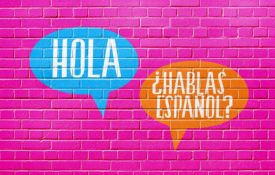-

New Content From Perspectives on Psychological Science
A sample of articles on repressed memories, the Implicit Association Test (IAT), creativity, self-perception, experimentation and validity, how speaking Spanish might protect against stress, science communication, and moral reasoning.
-

¡Hola! Cómo estás? Speaking Spanish May Protect Your Heart
By providing wider access to emotion words, creating the potential for more optimism, and enhancing social relations, the Spanish language may influence how individuals build emotion schemas and appraise stress, influencing cardiovascular reactivity and recovery.
-
UCLA Study: Babies in Bilingual Households Respond Better to ‘Baby Talk’
Babies will pay more attention to baby talk than regular speech, regardless of which languages they’re used to hearing, according to a study released today by UCLA’s Language Acquisition Lab and 16 other labs around
-

New Research in Psychological Science
A sample of research on attention to emotional stimuli, representations of time and number, choice and control, gender stereotypes in language, impressions of other people, gender gaps in negotiation, perceptual features in visual memory, the benefit of talent in team performance, and how children process what adults say.
-

New Content From Current Directions in Psychological Science
A sample of articles on the risk for alcohol use disorder, language comprehension in children with autism, varied skills, primate vocal communication, the importance of the context for child development, and the role of robots in understanding the human mind.
-

New Content From Perspectives on Psychological Science
A sample of articles on contact tracing as a memory task, challenges of military veterans in their transition to the workplace, the dehumanization hypothesis, and statistical learning and language impairments.

